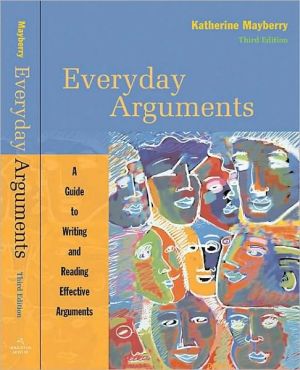

 |

|

Sold Out
Book Categories |
Note: Each chapter concludes with a Summary and Suggestions for Writing. I. Writing Arguments 1. An Introduction to Argument An Extended Definition The Classes of Argument Argument Through Image The Argument Process Reading Arguments Conclusion 2. Where Writing Begins: Motives and Audience Motives for Writing The Importance of Audience 3. The Claim How Claims Work Classifying Your Claim 4. An Argument's Support Some Varieties of Support Supporting Your Argument Visually Arranging Your Argument's Support Definitions 5. Supporting Your Arguments Honestly and Effectively Plagiarism and Written Arguments Finding Reputable Support Citation Form 6. Making Reasonable Arguments: Formal and Informal Logic Formal Logic The Toulmin Model: A Modern Variant of Formal Logic Informal Fallacies Eating Disorders in Males, Leslie Knowlton 7. Arguing Facts What Is a Fact? Factual Claims You Will Make Supporting Facts Factual Generalizations Statistics Two Sample Factual Arguments "Vonnegut Speech" Circulates on Net, Dan Mitchell 8. Arguing Cause Determining Cause Distinguishing Among Sufficient Causes Causal Chains Contributing Factors Supporting Causal Claims Arguing Effects Two Sample Causal Arguments I, Too, Am a Good Parent, Dorsett Bennett 9. Arguing Evaluations Evaluative Subjects and Terms Establishing the Definition of the Evaluative Term Arguing the Evaluation Further Methods of Supporting Evaluations The Varieties of Evaluations Sample Functional Evaluation 10. Arguing Recommendations Audience Needs and Values Recommendations Emphasizing the Present Recommendations Emphasizing the Future Recommendations That Consider Present and Future Two Sample Recommendations The Side Effects of Affirmative Action, Pamela J. Hsu 11. Writing and Image The Role of Voice The Virtues and Limitations of Plain Writing Figures of Speech Connotative Language and Slanting The Music of Language 12. Introductions and Conclusions Introductions Conclusions Summaries 13. Revising Writing a First Draft, Revising, and Editing Some Suggestions for Successful Revising An Example of Revision II. Reading Arguments 14. Today's College Student Retreat from Intimacy and Commentary, Arthur Levine and Jeanette S. Cureton College, My Way, Kate Zernike Super Egos, Peter Francese Who Is a Teacher? Celeste M. Condit A Lost Moment Recaptured, Sara Rimer Students Behaving Badly, Richard Flacks 15. The Internet Daemon Seed and Commentary, David S. Bennahum Stop Me Before I Shop Again, James Gleick Thoughts on Facebook, Tracy Mitrano The Real Digital Divide, economist.com Information Literacy: The Web Is Not an Encyclopedia Digital Divide, Wikipedia 16. Sports Little Girls in Pretty Boxes and Commentary, Joan Ryan Where Have All the Heroes Gone? Stephen D. Mosher The Chosen One, Gary Smith Public Use of Native American Names, Symbols, and Mascots, Richard P. Mills Sometimes, a Game Means Much More Than the Score, John Feinstein Bizball, Harvey Araton 17. Earning Your Living Why I Write and Commentary, George Orwell Fastest Growing Occupations, Daniel E. Hecker, Bureau of Labor Statistics On Dumpster Diving, Lars Eighner Lessons from 2 Ghosts, Scott M. Fisher Revenge of the Right Brain, Daniel H. Pink The Stress Myth, Richard Reeves 18. Diet The Diet Biz and Commentary, Donald Jackson Intuitive Eating, Evelyn Tribole and Elyse Resch Include Me Out: A Reflection on 'Ice Tea,' Fred Chappell My Story: Bob, Daniel Slosberg Bed Confessions, K.D. Elliott 19. Reading Popular Culture Popular Culture and the Family: How Mass-Mediated Culture Weakens the Ties That Bind and Commentary, Kenneth A. Myers Listening to Khakis, Malcolm Gladwell The Contents of Women's Purses: An Accessory in Crisis, Daniel Harris Truisms: 1978-1987 from MOMA Highlights Why We Crave Horror Movies, Stephen King Nonsense Watch, Howard Fienberg
Login|Complaints|Blog|Games|Digital Media|Souls|Obituary|Contact Us|FAQ
CAN'T FIND WHAT YOU'RE LOOKING FOR? CLICK HERE!!! X
 You must be logged in to add to WishlistX
 This item is in your Wish ListX
 This item is in your CollectionEveryday Arguments: A Guide to Writing and Reading Effective Arguments
X
 This Item is in Your InventoryEveryday Arguments: A Guide to Writing and Reading Effective Arguments
X
 You must be logged in to review the productsX
 X
 X

Add Everyday Arguments: A Guide to Writing and Reading Effective Arguments, Everyday Arguments combines a highly-practical, student-oriented argument rhetoric with an anthology of illustrative readings drawn from everyday life. Part I includes thirteen chapters devoted to the actual demonstration of how to write arguments—ranging, Everyday Arguments: A Guide to Writing and Reading Effective Arguments to the inventory that you are selling on WonderClubX
 X

Add Everyday Arguments: A Guide to Writing and Reading Effective Arguments, Everyday Arguments combines a highly-practical, student-oriented argument rhetoric with an anthology of illustrative readings drawn from everyday life. Part I includes thirteen chapters devoted to the actual demonstration of how to write arguments—ranging, Everyday Arguments: A Guide to Writing and Reading Effective Arguments to your collection on WonderClub |